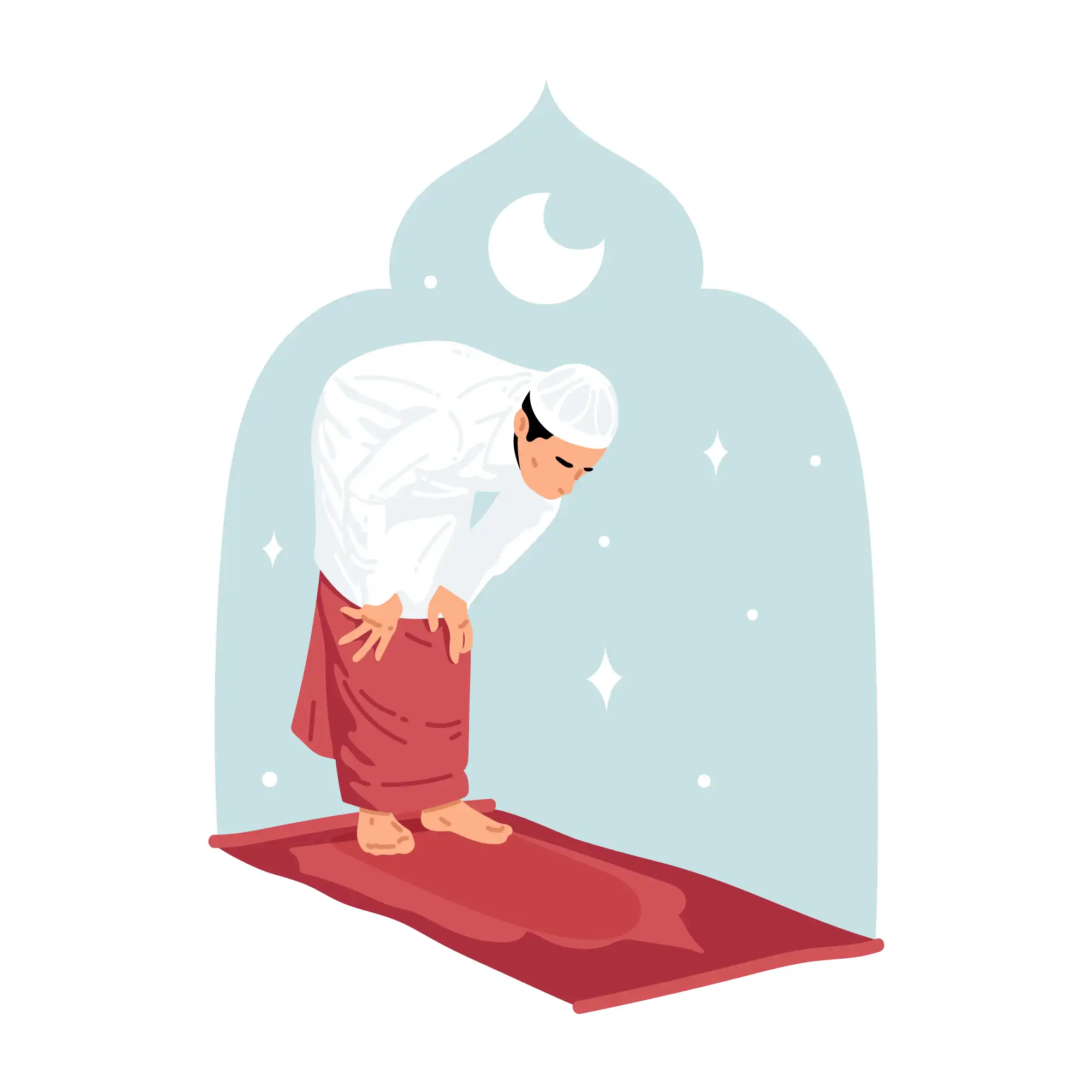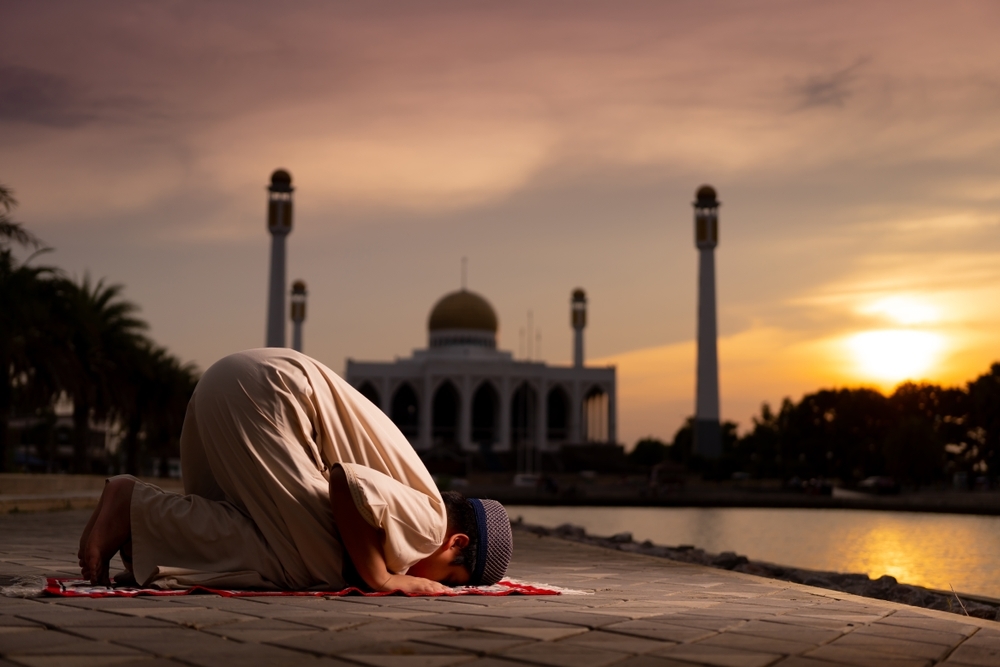Every Muslim must know how many rakats each prayer because that is one of the basics of the Islamic religion. There are five prayers in the day: Dhuhr, Asr, Maghrib, Isha, and Fajr, and their total is 17 rakats. In addition to that, there are confirmed Sunnahs that the Prophet, PBUH, urged us to pray to make up for deficiencies in the obligatory prayers.
Rakat Counts for Each Prayer

The answer to the question: how many rakats in each prayer is as follows:
Fajr (prayed at dawn)
Fajr prayer consists of only two rakats. It is the first prayer of the day and is performed before sunrise. Its virtue is great, as the Prophet, PBUH, said:
.”من صلى الفجر فهو في ذمة الله”
“Whoever prays Fajr is under the protection of Allah.”
BOOK FREE SESSION
Dhuhr (prayed at midday)
Dhuhr prayer consists of 4 rakats and is performed in the middle of the day. If Friday prayer is established, the Friday prayer is performed instead of Dhuhr and consists of two rakats aloud. The time for Dhuhr begins after the sun passes its zenith. and it is recommended to supplicate a lot at this time.
Asr (prayed in the afternoon)
Asr prayer consists of 4 rakats and is performed silently and comes after Dhuhr prayer and is performed in the afternoon. Its time extends until sunset.
Maghrib (prayed at sunset)
Maghrib prayer consists of only 3 rakats, and it is the only prayer whose number of rakats is 3. It is performed immediately after sunset and is distinguished by being the last prayer before Isha, and it has great virtue, as the Prophet, PBUH, mentioned:
“من صلى المغرب ثم جلس يذكر الله حتى يصلي العشاء كان في الجنة”.
“Whoever prays Maghrib and then sits remembering Allah until he prays Isha will be in Paradise.”
Isha (prayed at night)
Isha prayer consists of 4 rakats and is performed aloud in the first two rakats and silently in the rest. It is performed at night after Maghrib prayer and its time extends until midnight. It is an important prayer of the five prayers that Allah has obligated on Muslims.
Other Prayers – Extra Prayer (Nawafil)
These are the confirmed regular Sunnahs that the Prophet, PBUH, urged us to pray in order to make up for deficiencies in the obligatory prayers. There are twelve rakats, which are four rakats before Dhuhr and two after it, and two before Asr, Maghrib, Isha and Fajr.
Are there any Sunnah rakats associated with the obligatory prayers?

After you know the answer to the question how many rakat in each namaz, you must know that the Prophet, PBUH, was keen to perform a set of Sunnah prayers that accompany the obligatory prayers and are known as the regular Sunnahs. They are confirmed Sunnahs that show his keenness to increase in worship. These regular Sunnahs include four rakats before Dhuhr (with two Tasleems), and two rakats after it.
Two rakats after Maghrib, two rakats after Isha, and two rakats before Fajr prayer. It is also preferable to perform these Sunnah prayers at home, but there is no harm in praying them in the mosque. As for travel, it is better to leave them out except for the Sunnah of Fajr and Witr, as the Prophet, PBUH, was keen on them even in his travels. Normally, the answer to the question Where can a Muslim pray? is the mosque.
In addition to that, there are recommended but not confirmed prayers such as four rakats before Asr, two rakats before Maghrib, and two rakats before Isha, as the Prophet, PBUH, said:
“رحم الله امرأً صلى أربعًا قبل العصر”
“May Allah have mercy on a man who prays four rakats before Asr.”
And he urged prayer between the adhan and the iqama, saying:
بين كل أذانين صلاة، لمن شاء
“Between every two adhans is a prayer, for whoever wishes.”
These Sunnah prayers add blessing to the time and increase the servant’s closeness to his Lord. One must also adhere to all the Islamic prayer steps.
What is the difference between Fard and Sunnah rakats?
The determination of how many rakat in each salah was during the night of Isra and Mi’raj (the night journey and ascension of the Prophet) and through that the prayer was divided into two parts: the obligatory and the Sunnah and each of them has its rulings and status. The Fard is required of the Muslim and it is not permissible to abandon it deliberately. Whoever does that is sinful and may even reach disbelief if he deliberately abandons it without excuse.
As for the Sunnah prayers, they are recommended and the one who abandons them is not sinful, such as the Duha prayer, the Witr prayer, or the regular Sunnahs associated with the Fard prayers, and it is not permissible for a muslim in church.
Regarding performance, the Sunnah prayer can be performed sitting down, even if the worshiper is healthy and able to stand, as the Prophet, PBUH, used to do in some night prayers. However, he made it clear that the reward for the one who sits in the Sunnah prayer is half the reward for the one who stands. As for the obligatory prayer, it is not permissible to perform it sitting down except for an excuse such as illness or disability, where standing remains a basic pillar of it unless a legitimate excuse prevents it.
Some may wonder about The History Of Muzdalifah: it is the night of the tenth of Dhu al-Hijjah, where Muzdalifah is the place where the pilgrims spend the night on the tenth night. It is the third station of the pilgrims in the holy sites of Mecca.
How many rakats are there in the Witr prayer?

Islam specified how many rakat in every prayer so that Muslims adhere to them. The Witr prayer is one of the great Sunnahs that is performed after Isha or at the end of the night. The minimum is one rakat. A Muslim can also suffice with one rakat after the Sunnah of Isha, or postpone it to the time of dawn. However, it is better to add more to that, so he should pray three rakats, five rakats or more, provided that he performs them in pairs and gives the Tasleem after every two rakats and then concludes with one Witr.
The Prophet, PBUH, explained this approach by saying:
صلاة الليل مثنى مثنى، فإذا خشي أحدكم الصبح صلى ركعة واحدة توتر له ما قد صلى
“Night prayer is in pairs, and if one of you fears the morning, he should pray one rakat that will make Witr for what he has prayed.”
Whoever follows this Sunnah will attain great good and increase his closeness to Allah.
Some may ask: muslim prayer for woman? The answer is that prayer does not bring reward to others. A person must pray for himself, hoping for the reward from Allah SWT.
What if I forget to pray a rakat?
After learning about how many rakats in each prayer, you must know that if the worshiper forgets a rakat of his prayer and remembers it during the tashahhud, then he must immediately get up to complete the missing rakat, then perform the tashahhud again, and perform the prostration of forgetfulness before giving the Tasleem. It is not permissible for him to give the Tasleem of his prayer while he knows that there is a deficiency in the pillars, because the prostration of forgetfulness does not make up for completing the missing pillars.
It has been proven that the Prophet, PBUH, once prayed Asr three rakats and gave the Tasleem, then he was informed of that, so he got up and completed the fourth rakat, then gave the Tasleem and prostrated for forgetfulness after the Tasleem. This indicates the importance of making up for the missing pillar and completing the prayer in the best way.
the Prophet, PBUH, said:
إذا قدم العشاء فابدءوا به قبل أن تصلوا المغرب
“If dinner is served, then start with it before you pray Maghrib.”
Read about: prayer before eating muslim
Is there a specific number of rakats for the Tahajjud prayer?
The number of rakats for Tahajjud prayer is a matter of disagreement among scholars. However, they agree that the minimum is two light rakats, based on the saying of the Prophet, PBUH:
(إذا قام أحدكم من الليل فليفتتح صلاته بركعتين خفيفتين)
“If one of you gets up at night, then let him begin his prayer with two light rakats.”
As for determining the maximum, the opinion of the Hanafis was that the upper limit is eight rakats, pointing out that the Tahajjud of the Prophet, PBUH, ranged between two rakats as a minimum and eight rakats as a maximum. Despite this difference, Tahajjud remains one of the greatest Sunnah acts that bring a servant closer to his Lord. Also, prayers during Ramadan month, especially Tahajjud, have a great reward.
How long does prayer last for muslim? It varies depending on the humility of the Muslim, and it is recommended that the Muslim be humble in prayer.
Regarding the answer to the question, can you pray in islam in english? If the person masters Arabic, it is not permissible, and as long as he is able to learn it as well. If he is not able and only masters speaking English, it is permissible to speak in his language and perform the prayer or supplication.
Start Your Journey Today!
Sheikh Saleh Academy is considered one of the largest academies in the Arab world. It teaches the Quran, Tajweed, the Arabic language, and Sharia subjects because these matters are important in the life of every Muslim. One must learn the matters of his religion, and Sheikh Saleh Academy is the most suitable choice to develop your skills in these aspects. These are our courses:
- online quran classes
- tajweed quran
- quran memorization program
- quran ijazah online
- online arabic classes
- study islamic studies online
Whether you’re a beginner or seeking advanced knowledge, our expert teachers are here to guide you. Enroll Now and Begin Your Learning Journey. Sign up now for one of these courses.
